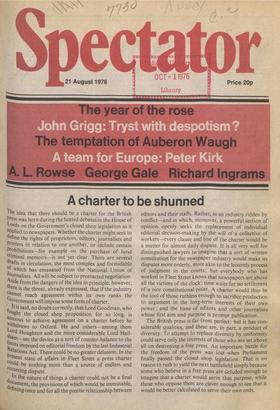A charter to be shunned
The idea that there should be a charter for the British Press was born during the heated debates in the House of Lords on the Government's closed shop legislation as it applied to newspapers. Whether the charter might seek to define the rights of proprietors, editors, journalists and Printers in relation to one another, or include certain Prohibitions—for example on the purchase of lurid criminal memoirs—is not yet clear. There are several drafts in circulation, the most complex and formidable of which has emanated from the National Union of Journalists. All will be subject to protracted negotiation. Aside from the dangers of the idea in principle, however, there is the threat, already expressed, that if the industry cannot reach agreement within its own ranks the Government will impose some fortn of charter. It is said, no doubt correctly, that Lord Goodman, who !Ought the closed shop proposition for so long, is anxious to achieve agreement on a charter before he withdraws to Oxford. He and others—among them 11°rd Houghton and the more considerable Lord Hail,s.uarn—see the device as a sort of counter-balance to the 'units imposed on editorial freedom by the last Industrial Relations Act. There could be no greater delusion. In the Present state of affairs in Fleet Street a press charter could be nothing more than a source of endless and recurring dispute. In the nature of things a charter could not be a final 113cument, the provisions of which would be immutable, uefining once and for all the precise relationship between
editors and their staffs. Rather, in an industry ridden by conflict—and in which, moreover, a powerful section of opinion openly seeks the replacement of individual editorial decision-making by the will of a collective of workers—every clause and line of the charter would be a matter for almost daily dispute. It is all very well for distinguished lawyers to imagine that a sort of written constitution for the newspaper industry would make its disputes more orderly, more akin to the leisurely process of judgment in the courts; but everybody who has worked in Fleet Street knows that newspapers are above all the victims of the clock : time waits for no settlement of a nice constitutional point. A charter would thus be the tool of those ruthless enough to sacrifice production to argument in the long-term interests of their own power; and the bane of editors and other journalists whose first aim and purpose is prompt publication. The British press is far from perfect : but it has considerable qualities, and these are, in part, a product of diversity. To attempt to replace diversity by uniformity could serve only the interests of those who are set above all on destroying a free press. An important battle for the freedom of the press was lost when Parliament finally passed the closed shop legislation. That is no reason to rush to yield the next battlefield simply because some who believe in a free press are deluded enough to imagine that a charter would serve that purpose, while those who oppose them are clever enough to see that it would be better calculated to serve their own ends.


































